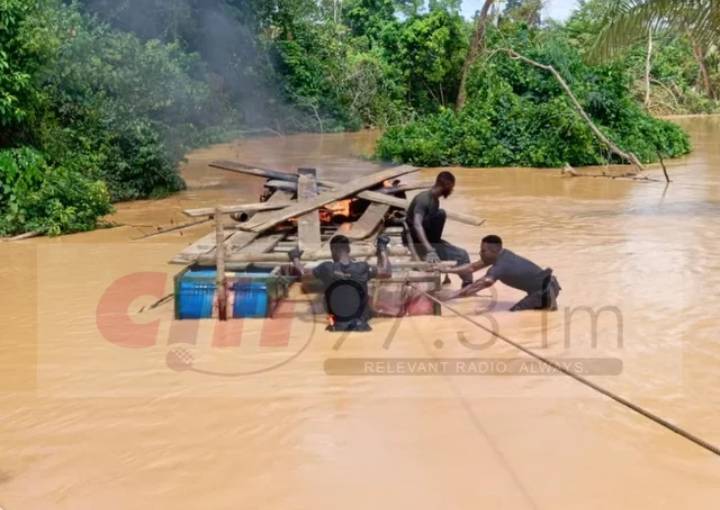Military Destroys Three 'Chanfans' in Anti-Galamsey Operation on Birim River
Date: November 4, 2024
In a decisive move against illegal mining, commonly known as "galamsey," the Ghana Armed Forces (GAF) successfully conducted an operation on the Birim River, destroying three "chanfans" used for mining. The operation was part of a renewed effort to address the environmental devastation and water pollution caused by galamsey activities, which have been a growing concern for local communities and environmental advocates.
The term "chanfan" refers to floating machines equipped with dredging equipment often used by illegal miners to excavate the riverbeds for gold. These machines are typically operated by local and, at times, foreign nationals, whose actions have contributed to severe siltation, water pollution, and destruction of aquatic ecosystems within major water bodies across the country, including the Birim River.
The Operation
According to GAF, the operation was carefully coordinated to target illegal mining hotspots along the Birim River. Military personnel deployed via both river and land routes to locate and dismantle the chanfans. The teams effectively neutralized three of these machines, rendering them inoperable and reducing the miners' ability to continue their operations in the area.
Military spokesperson Colonel Kwame Agyeman explained, "The operation on the Birim River underscores our commitment to protecting Ghana's natural resources and supporting the government's agenda to stop galamsey. Such operations will continue until illegal miners are completely flushed out from our water bodies."
Environmental and Community Impact
The Birim River is a vital source of drinking water, agriculture, and fishing for communities in the Eastern Region. However, illegal mining has contributed to high levels of heavy metals like mercury in the water, rendering it unsafe for both human and animal consumption. In addition, river pollution affects the livelihoods of local farmers and fishermen, causing widespread community outcry over the consequences of galamsey.
Local environmental activist Akua Osei, who has been leading awareness campaigns in the Eastern Region, commented on the military’s efforts, saying, "Our rivers and forests need urgent protection, and this operation is a positive step. But we also need continued monitoring to ensure the miners don’t return after the military leaves."
A Government Priority
The fight against illegal mining remains a priority for the Ghanaian government. Authorities have stepped up anti-galamsey operations across the country, utilizing both military and police forces to tackle the issue. The government has also introduced initiatives such as the Community Mining Scheme to offer legal and environmentally responsible alternatives to illegal mining, encouraging miners to comply with Ghana’s mining regulations.
However, the battle against galamsey faces multiple challenges, including the high demand for gold, unemployment in rural areas, and the involvement of organized groups that profit from the activity. Although military operations can reduce illegal mining activity, many believe that lasting change requires sustained community involvement and alternative livelihood programs to reduce dependence on illegal mining.
Looking Forward
As the government continues its commitment to address illegal mining and protect the environment, local residents and advocacy groups are hopeful that initiatives like the recent military operation will help preserve Ghana’s rivers and forests. The GAF has assured the public that similar actions will continue across all regions affected by galamsey, while also urging local communities to report illegal mining activities to aid enforcement efforts.
Conclusion
The destruction of chanfans on the Birim River represents a significant win for environmental protection efforts in Ghana. However, the larger fight against galamsey remains a long-term challenge. As military interventions continue to target illegal mining activities, support from local communities, law enforcement, and alternative economic opportunities will be crucial in ensuring that Ghana’s natural resources are preserved for future generations.




No comments yet
Be the first to share your thoughts!